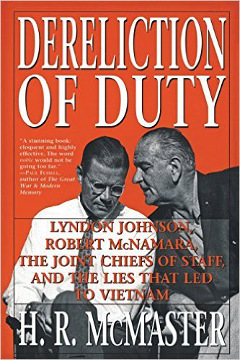With Michael Flynn resigning the post after a few weeks, and Vice Admiral Robert Harward turning the position down, the Trump Administration has settled on Lt. Gen. H.R. McMaster as their latest National Security Adviser, something of a surprise as he was not widely reported as among the front-runners.
 The most prominent front-runner in recent days was ultra-hawk John Bolton, who the Trump Administration ultimately decided against, but who Trump insists will still be given some position of import in the future.
The most prominent front-runner in recent days was ultra-hawk John Bolton, who the Trump Administration ultimately decided against, but who Trump insists will still be given some position of import in the future.
McMaster’s primary claim to fame is the 1997 book Dereliction of Duty, in which he details the failures of the Vietnam War, and argues that the military leadership had failed to communicate to Defense Secretary Robert McNamara that his strategy was failing. He goes on to argue that military actions intended to show American “resolve” tend to fail if they lack concrete military objectives.
McMaster has more recently served as a strategist, working on the potential of a US ground war in Eastern Europe against Russia. The question of whether the US can fight and win a land war against an enemy of comparable size and capabilities is a serious debate, with retired Col. Douglas Macgregor arguing that major reforms are needed to fight Russia.
McMaster, who is in charge of those reforms, and has been described as the “architect of the future US Army,” disagreed with Macgregor, saying that the US ability to defeat Russia militarily is just one aspect of the problem, and that the real question is whether the Army has the capabilities to manage the post-conflict environment.
In this regard, Macgregor is an advocate of smaller, better forces, reflecting his previous advocacy of a smaller US invasion of Iraq in 2003, with an eye toward a very quick, decisive win. McMaster, however, notes that the Army is never asked to just fight and win, but also expected to “maintain the peace,” sometimes for years on end.
Instead of focusing just on combat, McMaster has argued the military’s big problems are a need to focus more heavily on their capacity to nation-build, saying that the leadership and the American people need to both realize the Army is expected to “shape political outcomes,” and that the resources they are given need to be up to that job.
In that regard, McMaster presented the Korean War as a model, arguing the US military had done a lot more in the 60 years there than just fighting North Korea. That South Korea has gone through six official “Republics” in that time, along with periods of martial law and coups d’etat makes it an odd choice for a model for long wars.
In fact that might put him at odds with President Trump, who has argued against nation-building as a general rule. It isn’t clear exactly what about McMaster has put him in Trump’s good graces to the point of getting this position, but his argument that military leaders need to be frank with criticism of the civilian leadership might make this a rocky relationship.


